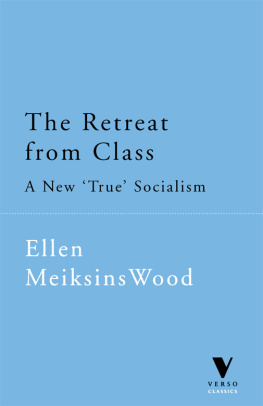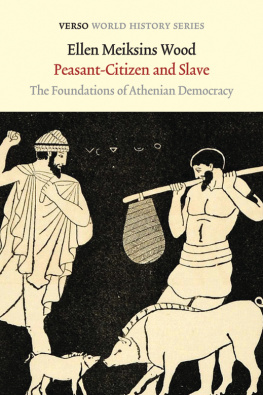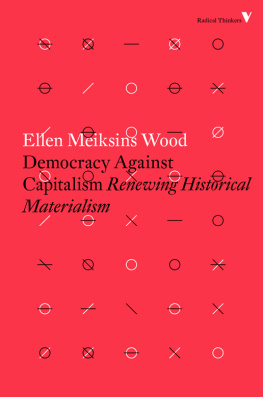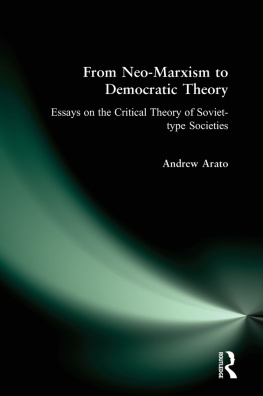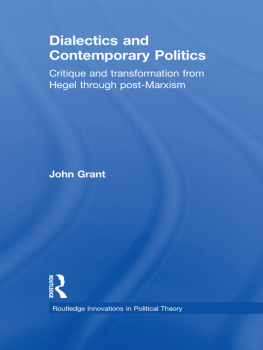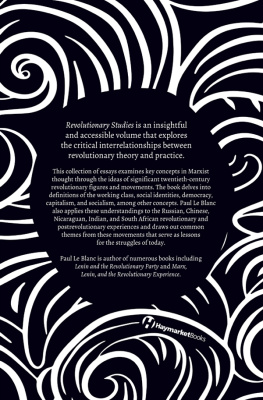In the original acknowledgements, I thanked Peter Meiksins, Neal Wood, Neil Belton, Robin Blackburn, and especially Gregory Meiksins and Perry Anderson, for criticisms and suggestions. I would now like to add Sebastian Budgen for his helpful comments on the new Introduction.
An author is bound to look back with a certain unease at a book published more than a decade ago, especially a book written at a particular political conjuncture and in response to a very specific and short-lived intellectual current. There are the inevitable regrets about this or that formulation or judgment. Some personalities and ideas that seemed important then are likely to have virtually disappeared. And the sense of distance will seem even greater when the intervening years have seen a major historical rupture in this case, one of the greatest epochal shifts in modern times: the collapse of Communism.
The Retreat from Class belongs to its time. Yet I think it had, and still has, something to say beyond its critical commentary on a now defunct intellectual tendency. It was certainly intended as a theoretical reflection on larger questions which are at least as current today as they were then questions to do with class, ideology and politics, socialism and democracy. But I also like to think that even as intellectual history its significance has outlived its subject. Post-Marxism may be yesterdays news, but its progeny is very much alive in todays intellectual fashions and I think the book can claim the virtue of having, on the whole, seen where things were going.
On the face of it, a lot has changed in the intellectual life of the left since 1986, and in the wake of 1989. For instance, when The Retreat from Class was first published, the term post-Marxism was still just establishing itself. These days it hardly means anything any more. Those who might once have described themselves in these terms would probably disavow that self-description now, at least in its original meaning. After all, when the phrase was coined, it was meant to convey that, while its exponents felt they had moved well beyond Marxism, they still acknowledged their roots in, and their debt to, that tradition. Today, their connections with Marxism are very distant and tenuous, almost invisible. People have, in their various ways, moved on, in directions that have very little to do with Marxism, or even socialism, except to repudiate it. It seems clear that post-Marxism was just a short pit-stop on the way to anti-Marxism.
Still, it would be a mistake to attribute this trajectory solely, or even primarily, to the dramatic events of the late 1980s. For that matter, it would be a mistake to exaggerate the changes in the intellectual and political configuration of the post-Marxist left after the fall. There is an unbroken continuity between early post-Marxism and todays postmodernism with, among other things, their common emphasis on discourse and difference, or on the fragmentary nature of reality and human identity. Those continuities are, if anything, more remarkable than the changes, and their roots can be traced even further back, to the 1950s and 60s, to the formative years of the post-Marxist luminaries.
To put those continuities in perspective, let us first consider the changes. One of the constitutive contradictions of post-Marxism was that even those who insisted most emphatically on difference, and who most forcefully repudiated essentialism, universalism and class politics, still professed a commitment to certain inclusive and embarrassingly universalistic political objectives, including socialism. In the presence of so much difference, and in the absence of a unifying social base like class, these universalistic objectives compelled post-Marxists to rely on very general and socially indeterminate political principles. In particular, the post-Marxist concept of radical democracy, which was meant to replace or subsume the traditional socialist project, had to be defined in terms vague enough to serve as a kind of lowest common denominator among irreducibly different emancipatory projects with no significant common foundation.
The democracy in radical democracy was, in any case, always deeply ambiguous. At its worst, and in default of a social foundation, the post-Marxist doctrine of radical democracy assigned an inordinately large political role to intellectuals and their discursive practices, with positively anti-democratic implications. The real democratic struggles to which post-Marxism professed to be committed struggles, for instance, against racial or sexual oppression tended to be overshadowed by the academic politics of discourse analysis. At its best, the social indeterminacy of radical democracy made it politically vacuous. For all its anti-universalism, this post-Marxist concept turned out to be could only be far more abstractly universalistic, and far less sensitive to social and historical specificity, than the essentialist Marxist conception of socialism it was meant to replace.
Here, if anywhere, postmodernism represents a shift. Postmodernists, to the extent that they remain committed to egalitarian goals or to some kind of social justice, have not entirely escaped this contradiction between emancipatory aspirations and the repudiation of any moral or political foundation to support them. But, on the whole, postmodernism has more or less decisively resolved that contradiction in favour of fragmentation and difference. There is here no lingering attachment to any kind of universalism, foundationalism, rationalism, or the Enlightenment project. The end result has been not only to repudiate socialism or any other universalistic politics, but effectively to deny the very possibility of political action altogether. Postmodernism cannot offer a plausible ground for its own emancipatory commitments or, for that matter, its own radical pluralism. In fact, it is hard to see how even a political principle as vague as the post-Marxist version of radical democracy could survive the postmodernist destruction of all political foundations.

